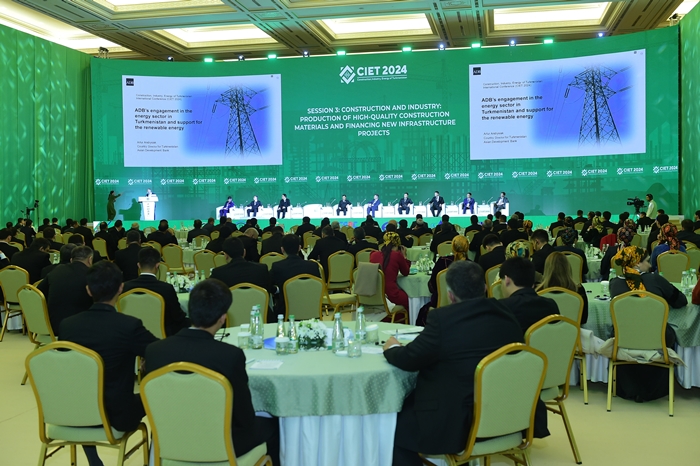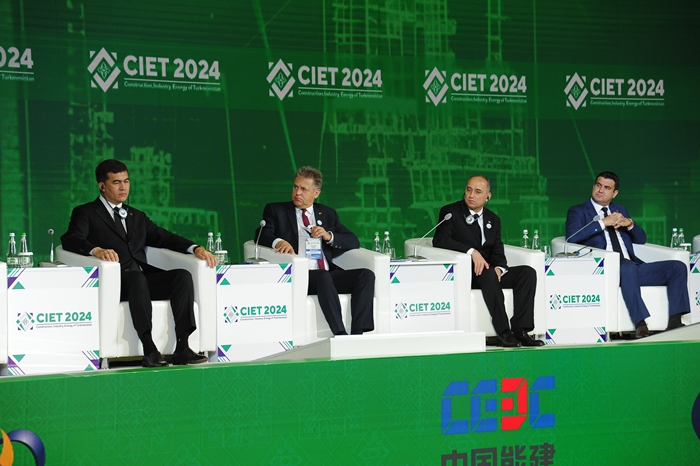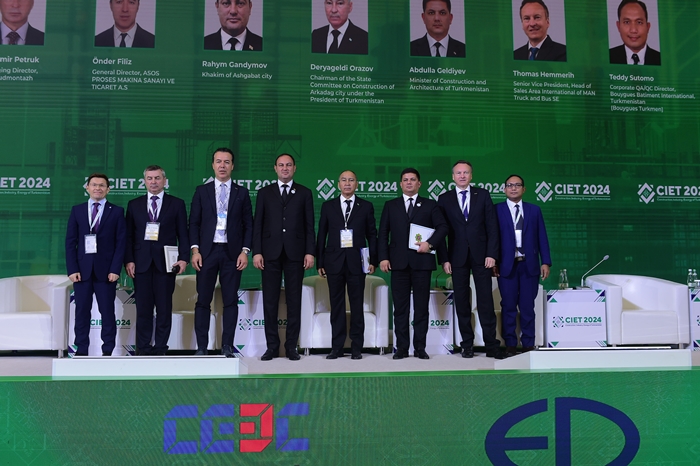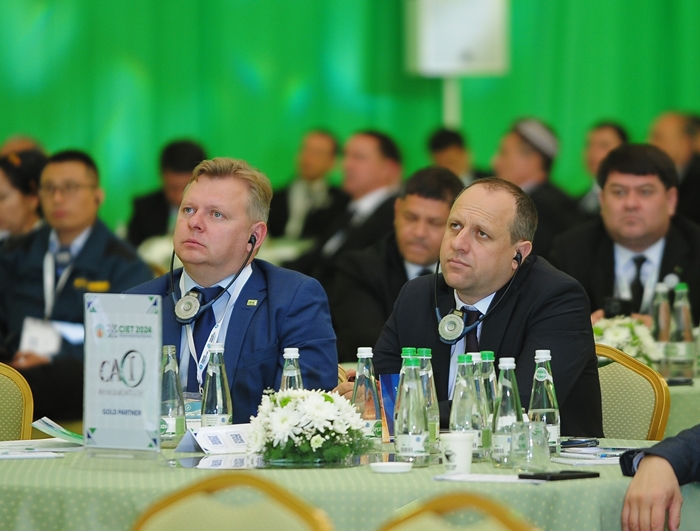The second day of CIET 2024 was an exceptionally eventful day, marked by a packed schedule of four high-profile sessions that brought together key stakeholders from the energy, industrial, and agricultural sectors. Each session offered deep insights into the strategic directions Turkmenistan is pursuing in hydrocarbon resource development, renewable energy adoption, and sustainable agricultural practices, showcasing a cohesive approach to diversifying the nation’s economic landscape.
 The Session 1, a lively exchange on “Accelerating Monetisation and Diversification of Hydrocarbon Resources with a Focus on Energy, Chemical Utilisation of Gas, and Fertiliser Production,” set the stage for the day’s discussions.
The Session 1, a lively exchange on “Accelerating Monetisation and Diversification of Hydrocarbon Resources with a Focus on Energy, Chemical Utilisation of Gas, and Fertiliser Production,” set the stage for the day’s discussions.
The session was enriched by contributions from distinguished speakers: Annageldi Saparov, Minister of Energy of Turkmenistan; Dovrangeldi Sapbaev, Chairman of SC “Turkmenhimiya”; and Charyyar Chetiev, Minister of Agriculture of Turkmenistan. International industry leaders, including Min Manjun from Daewoo Engineering & Construction, Jee Hwan from Hyundai Engineering, Joachim Fritz from Deutsche Gesellschaft für Internationale Zusammenarbeit (GIZ) GmbH, and Tomohiro Takashina of Kawasaki Heavy Industries, shared their insights in their video address. Allan Pickett of S&P Global Commodity Insights provided perspectives on the fertilizer industry’s global outlook, with moderation by Maxim Ismagilov, Chief Analyst at S&P Global Commodity Insights, who guided discussions with expertise.
 The second session of the day focused on “Modern Trends in Architecture and Urban Development: Smart City Arkadag – A City of the Future and Opportunities.” Experts and leaders discussed key directions that will transform Arkadag and Ashgabat into models of advanced urban development.
The second session of the day focused on “Modern Trends in Architecture and Urban Development: Smart City Arkadag – A City of the Future and Opportunities.” Experts and leaders discussed key directions that will transform Arkadag and Ashgabat into models of advanced urban development.
Key topics of the session included:
New Projects in Arkadag and Ashgabat: Deryageldi Orazov, Chairman of the State Committee on Construction of Arkadag, presented projects for the next phase of the city’s development, including a medical-industrial cluster. In Ashgabat, innovative projects are also underway to enhance urban quality, as outlined by Rahym Gandymov, Khakim of the city.
Quality Standards and Seismic Resistance: Abdylla Geldiyev, Minister of Industry and Architecture, emphasized the importance of new quality standards, while representatives from Interbudmontazh and Bouygues shared their experiences in implementing seismic-resistant technologies, crucial for safety in earthquake-prone regions.
Notable speakers included Vladimir Petruk, Managing Director of Interbudmontazh; Önder Filiz, General Director of ASOS Proses Makina; and Thomas Hemmerich of MAN Truck and Bus SE. The session was moderated by UN Economist Uladzimir Valetka.
This session highlighted Turkmenistan’s commitment to creating sustainable, modern urban infrastructure, positioning it as a regional leader in urban planning and architecture.
 The Session 3, titled “Construction and Industry: Production of High-Quality Construction Materials and Financing of New Infrastructure Projects,” was dynamic and insightful, highlighting Turkmenistan’s growing role in the global industrial landscape. The session delved into the potential of industrial cooperation on a global scale, sharing experiences that showcase Turkmenistan’s ambitions to integrate into the global economy through high-quality construction materials and significant infrastructure investments.
The Session 3, titled “Construction and Industry: Production of High-Quality Construction Materials and Financing of New Infrastructure Projects,” was dynamic and insightful, highlighting Turkmenistan’s growing role in the global industrial landscape. The session delved into the potential of industrial cooperation on a global scale, sharing experiences that showcase Turkmenistan’s ambitions to integrate into the global economy through high-quality construction materials and significant infrastructure investments.
Key topics included:
Industrial Cooperation and Prospects: Toyguly Nurov, Minister of Industry and Construction Manufacturing, outlined strategies for fostering cooperation that connects Turkmenistan with international partners, opening doors to both industrial expertise and investment opportunities.
Global Trade and Industry Trends: Mammetguly Astanagulov, Deputy Minister of Finance and Economy, discussed the latest trends in trade and industry, exploring how Turkmenistan can leverage its resources to align with these trends and strengthen its regional influence.
Digitalization’s Role in Industry: With digital transformation sweeping across global markets, panelists emphasized how digitalization is reshaping trade and industry, improving efficiencies and expanding reach.
Notable speakers such as Rahymberdi Jepbarov from The State Bank for Foreign Economic Affairs, Artur Andrysiak from ADB, Sergey Lobanov of Sumitomo Corporation, and representatives from Polat turba kärhanasy and China Energy International Group provided a wealth of expertise, making the session both forward-thinking and practical. Moderated by Jeffrey McDonald from S&P Global Commodity Insights, the discussions left a strong impression of Turkmenistan’s readiness to advance in construction and industrial development on a global stage.
 The final session, titled “The Role of Public-Private Partnerships in the Development of Construction, Industry, and Road Construction,” provided key insights into how PPPs are advancing Turkmenistan’s infrastructure. Speakers highlighted practical applications, including road construction and transport infrastructure, and emphasized critical legal and financial considerations.
The final session, titled “The Role of Public-Private Partnerships in the Development of Construction, Industry, and Road Construction,” provided key insights into how PPPs are advancing Turkmenistan’s infrastructure. Speakers highlighted practical applications, including road construction and transport infrastructure, and emphasized critical legal and financial considerations.
Highlights included:
PPPs in Road Development: Hangeldi Kerimov from the State Agency for Highway Construction showcased successful PPP projects driving national infrastructure.
Legal and Financial Frameworks: Eric Livny of the EBRD, as moderator, explained key structures that ensure stable, successful partnerships in construction and road development.
Innovation and Digitalization: Siarhei Talatai from STiM Group discussed smart city solutions, while representatives from MAN Truck and Bus and ES “Muhammet-Balkan” shared the latest digital advancements in construction.
Concessions and Private Investment: Tachmyrat Gurdov from the Union of Industrialists and Entrepreneurs and Mekan Atdayev, project manager of the Sarahs-Mary-Serkhetabat highway, explored concession management and private investments in large-scale projects.
This session underscored how PPPs and innovation are essential for Turkmenistan’s sustainable and advanced infrastructure development. ///Turkmen Energy Forum